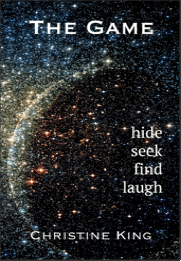
The illusion of control
Question: What is the human mind? What is its purpose? Mine seems to do nothing but mislead, confuse, and disappoint me lately…
Which is to say that I seem to do nothing but mislead, confuse, and disappoint myself lately.
Why, when I so want to understand how life works and how I can be better at it — which is to say, how I can get what I want. Without any further delays, obstacles, or other obstructions.
I don't revel in the process of its unfolding, its becoming, when I can see no evidence of it. None. Nothing. Silence. Absence. Indifference from everything around me. It's as if I don't exist, that I don't matter, that what I want is being withheld from me, no matter how much expecting and allowing and inviting I do. At every turn, I run into a blind alley, another dead end.
What gives?
I do. I give up! Again. I'm so sick of this pattern of seeming enlightenment, followed by enthusiasm and confidence that eventually turns into impatience, frustration, disappointment, and disillusionment. I'm missing something. What is it?
Answer: The imagined sense of mastery, of understanding, is the illusion of control. You're getting caught up in the mechanics of creation. It's good to enjoy, to revel in, the details as they unfold. It's counter-productive to try to orchestrate those details, like the Sorcerer's Apprentice.
Question: That's harsh.
Answer: It's not meant to be. You asked about the human mind. Its role is to observe, to appreciate, to experience, to be aware — and to decide on preferences, to see and to say Yes or No to every experience. To participate by observing and by choosing. To play with the available options and to imagine new ones into being. It's not for playing god, as most people use the term.
Question: I don't quite understand the distinction. It seems like a very fine line to me. How do I create the life I want, the things and experiences I want, by not creating anything, by not doing anything?
Answer: That's not what I'm saying. The distinction is all about perspective, point of view, intention.
In the first instance (observe, decide; imagine, decide), your mind is fully engaged, yet it is light, playful, free, and thus not obstructing anything, any observation, any action.
But in the second, your mind is assuming the role of controller, of instrument, musician, composer, conductor, and audience. It is dictating the terms of your life experience, and even your life itself as you repeatedly threaten to end it.
Self-destruction is the ultimate mental act of control, and the best example I can think of for the misguidance inherent in assuming absolute control over your life, your experience, and what you do with it.
Question: So, then walk me through the process of getting the life I keep imagining for myself. Last night I realised that I was being too fixated on the details, that I should let my mental image of it go, as there is now no hope of me getting it in the time (which is to say, with the money) I have left.
Answer: That may well be true in the minds of others, in the conventional sense, in the consensus view of human minds at this point in time. But it is FAR from true in the broader sense. You really can have the life you want. Just continue to imagine it into being. Continue to hold it lightly and playfully in your mind. Savour it, revel in it, and play with it. What comes next? Once you get there, what then? What will you do there? What will you do next?
Question: [And then I described what I want to do next, once I get to where I'm going.]
Answer: Very good. Let's begin.
Question: Can we go back to “observe, decide; imagine, decide”? Is it really as simple as that?
Answer: Yes it really is as simple as that. In this way, you observe the details and you create the life you want as you go, because your choices of Yes/No refine your initial vision for your life to make it much more satisfying once it's done.
You know this from the experience of writing a book or even just an article. You have a general idea of what you want to write — and why — at the start, but you have many more ideas, and you make countless small decisions (revisions, expansions) as you go.
In fact, you've often noted that the book or article is never really done; at some point, you simply have to stop and call it finished. It may at that point be very pleasing to you and very satisfying. Yet when you read it again after a space of time, there are always things you want to change about it.
So, too, with anything you create.
Thus, your vision for the life you want is simply a template, a starting point. As you create it, you'll make countless decisions along the way, crafting, revising, refining, and perhaps even reimagining it as you go along. Even once you get there, you'll want to refine it further, and you may want to reimagine some parts of it for greater enjoyment.
And note, too, that as soon as you get there, or shortly thereafter, you'll be ready to create the next thing. Books, gardens, friendships — you name it; it's all an ever-evolving thing as you integrate–dis-integrate–re-integrate… on and on, ad infinitum.
You can do that with your body as well.
Question: Really? With my body as well? Won't I continue to age and dis-integrate?
Answer: Ah. That's a common misconception, based on a common experience: aging as entropy (dis-integration). Most of the cellular processes of aging are not about disintegration but rather “fossilisation” — lack or failure of normal cell cycling, loss of movement, of the free flow of energy through the system, loss of the normal interchange of attractive–repulsive forces that is the lively process which characterizes the maintenance of physical forms and functions. It is the lack of movement, flow, exchange, energy transfer and sharing within and among systems.
As you age, you become more rigid, more fixed, as you try to control more and more of your life, more and more of your experiences and everything around you, including those you love (on condition that they do not change or that they change to please you and then do not change further).
This is a good example of the second instance I mentioned, where the whole point of greater understanding is greater control. The desire for it — no, the imagined need for it — and the relentless seeking of it, striving for it, preservation of it, and vigorous defense of it — because it, too, is something that you don't want to change once you secure it.
Secure; that's an interesting choice of word. Security becomes paramount when change is seen as undesirable, as a threat. So, it's no wonder that aging bodies “ossify” or “petrify” in a culture that attempts to control everything — most especially itself, because each of its members desire greater control over their experience.
Wisdom lies in doing the opposite.
Success lies in doing the opposite.
Health lies in doing the opposite.
Relinquish all sense, all notions, that you can control your life, your body, your experience. Do the radical thing and fling all sense of control to the wind. There is so little that you can control — and that's just as well, because that sort of control is antithetical to life. So much of life is designed to take care of itself that the wisest possible course is to LET IT!
And that applies equally to creating and refining things in your own life. Relinquish control of the whole process — not just the fine/small details; the whole thing. Enjoy the details, certainly. Revel in them. They make life vastly more interesting, rich, engaging, rewarding. Just avoid the temptation to direct them, manage them, cause them to be or do one thing or another. Let them be.
Express your preference — your Yes — and then just keep on rolling. Life is much more fun this way, ant it lasts much longer. Not only does time do funny things — stretching to infinity, standing still, disappearing completely (like now) — but the freedom you allow your body to take care of itself and keep renewing itself means that you get to live longer, too.
You really can have the life you want.
Just continue to imagine it into being,
to hold it lightly and playfully in your mind.

The Game
hide seek find laugh
Christine King
KINDLE eBOOK
USD: $3.50
PAPERBACK
USD: $15.95
EPUB eBOOK (lulu.com) * for e-readers that don't support Kindle files
USD: $3.50
Also available on Apple Books, Barnes & Noble Nook, Kobo Bookstore, and many other online bookstores.